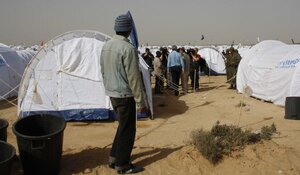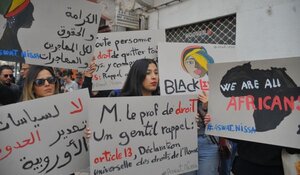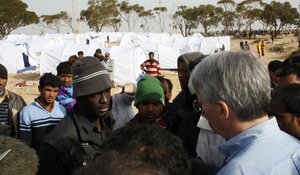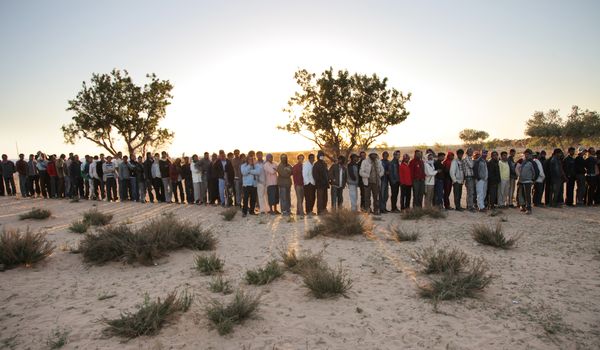Deadly consequences of Anti-Blackness in migration policies
For Rayhan Jlidi, violence against Black African migrants, refugees, and asylum seekers has become part of her life as a migrant in Tunisia. She reports how Black Africans are forced into the dessert and left there to die. In Tunisia, violence against Black Africans occurs both through state actions and civilian aggression. On 9 April 2025, a 32-year-old Guinean man was shot and killed by a Tunisian civilian. Shortly thereafter, a 38-year-old Malian man died under similar circumstances. These incidents are part of a broader pattern of increasing racist violence against Black Africans in the country and highlights the deadly consequences of Anti-Blackness in Tunisian migration policies – and by extension of the EU.

Migrants' rights are human rights. Full stop.
When states systematically deny migrants and refugees fundamental rights, migrants often encounter systemic barriers that severely restrict their access to essential services such as healthcare, education, and housing. For example, Rayhan Jlidi reports that in Tunisia, Black African migrants, refugees and asylum seekers face widespread exclusion from social services. Migrant women, especially those who are undocumented, often lack access to decent work. They are therefore more likely to accept deplorable working conditions, with many working in the informal economy with limited or no labour protection, exacerbating their risk of gender-based violence, abuse and exploitation in the workplace. Jlidi observes that many women end up working under precarious conditions in the service sector, e.g. cleaning the houses of Tunisian citizens. This dynamic highlights two interconnected dimensions of a capitalist economy and exploitation of migrants. On the one hand, migrants and refugees in Tunisia are excluded from formal labour markets, leaving them with no choice but to accept informal, low-paid, and insecure work. On the other hand, this very vulnerability is instrumentalized by parts of the Tunisian population, who benefit from cheap and unregulated labour. Thus, the Tunisian economy not only produces but also relies on the structural precarity of migrants, refugees and asylum seekers.
In response to these unhuman conditions, migrants organise themselves and mobilize to assert their right to protest and demand fair treatment. Instead of improving the living conditions, the Tunisian government is criminalising migrant activism and people in solidarity of migrants and refugees. In the light of this, Rayhan Jlidi emphasises, her activism has changed over time. She explains that at the beginning she was able to directly support other migrants and refugees, accompanying them to shelters. Today she is more engaged in educating others about their rights. Her political engagement shows that activism is not a choice, it is a necessity. Therefore, it is crucial to recognize that migrants, refugees, and asylum seekers are not merely passive. Despite the state violence in the countries they live in, migrants and refugees are active agents pursuing justice, dignity, and recognition.

State violence at all stages of migration
Women and girls are likely to experience a continuum of gender-based violence at all stages of migration, from bullying and verbal, physical and psychological abuse to sexual violence. Incidences of violence often take place not once but multiple times, along the route in the country of origin, while in transit, on arrival in the country of destination and upon return. For instance, in a study of the Women’s Refugee Commission (2019) conducted with migrants who had travelled along the Mediterranean route from Northern Africa to Italy, it was estimated that 90 per cent of the women and girls who participated in the study were raped at some point during their journeys. In addition, some migrant women, particularly those who are using irregular channels, face increased risk of becoming victims of trafficking in persons, especially for the purpose of sexual exploitation, as well as labour exploitation and domestic servitude.
Tunisia is a transit for many refugees and migrants. A 2020 report by the United Nations Office on Drugs and Crime (UNODC) reveals that sexual violence and exploitation are common experiences for migrant women in transit along irregular routes in North Africa. These abuses are mostly perpetrated by migrant smugglers, security forces and armed groups. According to UNODC, data shows that 19% of female refugees in Libya reported having experienced sexual violence, compared to 6% of men, which highlights increased gender-based insecurity for women as migrants. Therefore, the gender dynamics in trafficking and exploitation along migration routes particularly affects women producing abuses related to the instrumentalization of their bodies, either for systematic violence or transactional sex.

EU funds do not save lives, they finance state violence
Migration control policies are linked to Anti-Blackness such as border externalization and return agreements. Agreements negotiated between the European Union and North African states contribute to conditions that enable such violence. Often framed as technical measures, these policies are rooted in colonial continuities and operate on racialised logics that devalue Black Africans. Recognizing the deadly consequences of racial violence requires understanding the intersection of state policies and racial ideologies that produce and sustain this harm.
European incentives have not only empowered Tunisia’s securitized approach to migration but also lent tacit legitimacy to the racial profiling and mistreatment of Black Africans. The EU's funding priorities, with focus on returns, interdictions, and deterrence, do little to challenge the discriminatory treatment of migrants within Tunisian territory. On the contrary, the 2023 EU-Tunisia Memorandum of Understanding (MoU) risks reinforcing violence and oppression. It operationalizes Anti-Blackness in ways that reflect its internal racial hierarchies where Black African migrants, particularly women, are hyper-visible targets of exclusion but invisible in terms of protection. In partnering with Tunisia and other partners, the EU not only exports its own racialized migration priorities but also sustains environments where other forms of anti-Black discrimination flourish unchecked.
Although other EU frameworks such as the Istanbul Convention or the EU’s third Gender Action Plan refer to gender sensitive policies on migration and asylum, the EU sees no reason to uphold its own commitment in the EU-Tunisia MoU. In contrast, the EU exports and externalises violent migration policies where Black African refugees, migrants and asylum seekers are denied basic human rights by design.

